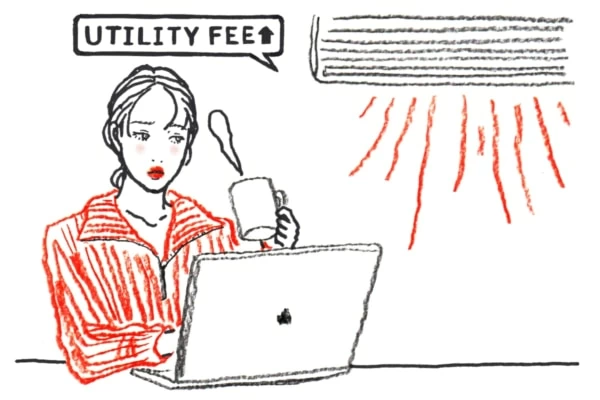The way we work, the way we love, the way we live, everything is different now in Reiwa. Experts in various fields will answer the "new money hacks" behind the countless changes. The respondent this time is FP (Financial Planner) Harumi Maruyama.

"Kotatsu" is by far the best heating efficiency!
First of all, as a premise, the heating equipment that can be used in a studio or 1K is generally an air conditioner, a kotatsu, an electric stove, an oil heater, and a hot carpet. Fan heaters that use kerosene as fuel are often prohibited because they can cause fires and condensation.
The kotatsu is the most economical heater you can use.
Air conditioner and kotatsu, one-room ・Comparing electricity bills for one month
: ・Air conditioner: 3,192 yen
・Kotatsu: 660 yen
*When left on for 8 hours a day
The kotatsu is said to be very efficient in heating, as it is designed to keep heat from escaping from the 80cm square, in addition to the low cost of electricity. If you work from home a lot, you can work on your computer while sitting under the kotatsu.
Air conditioners have the effect of heating the entire room, but the electricity bill is high anyway. Also, stoves and oil heaters can only heat a small area, and if you put a hot carpet directly on the floor, the heat will escape to the floor and the warm air will rise to the ceiling.
Tips for saving energy when using an air conditioner
However, there may be people who say, "The room is not large enough to put a kotatsu" or "I don't want to add new heating equipment."
From here, we will introduce how to efficiently heat a room with just the air conditioner you have now.
Check the proper temperature of the air conditioner
First, set the correct temperature. Winter is generally considered to be 20 degrees , but it varies depending on the living environment. People in cold areas, and even in the Kanto region, rooms facing north or east often feel chilly, so it's okay to set it a little higher.
Do not turn it on and off frequently
The same goes for the air conditioner, but try not to turn it on and off frequently . The air conditioner consumes electricity when it starts up. According to Daikin's research, it is better to leave the air conditioner on for 30 minutes in winter. If you're going to throw away the trash or go to a nearby convenience store, don't erase it.
However, if you leave it on for a long time, it will waste your electricity bill, so be careful. Turn off the air conditioner and close the curtains to keep the heat out .
Regular replacement and maintenance
If you feel that the air conditioner does not work well, the inside or filter may be dirty, the outdoor unit may be out of order, the gas may be leaking, or the air conditioner itself may be old.
Home appliances basically have a useful life of 10 years , so if it exceeds that, be prepared to buy a new one. If it is less than 10 years old, please perform regular maintenance such as cleaning and repair.
Warm and saving techniques that can be done immediately without increasing the number of heating appliances
In addition to this, there are other ways to warm up the room with devices other than heaters.
prevent heat from escaping through windows
Warm air escapes through the windows, and cold air enters through the windows. Therefore, curtains that are too thin or that are not long enough will allow heat to escape, so replace them.
Thick curtains with high blackout properties are recommended. Of course, choose the one that satisfies the length of the length and close it without any gaps. This is a device to increase the efficiency of cooling and heating, so it is also effective when using air conditioning in the summer.
Let's raise the sensible temperature with clothes
The neck and ankles are areas that tend to feel cold. Let's devise a neck warmer, socks, haori, etc. The sensible temperature rises without raising the temperature of the air conditioner.
Don't forget "humidification" that is often overlooked
It is said that when a room dries out in winter, the humidity drops and the sensible temperature also drops. Use a hygrometer to keep the proper humidity (around 40-60%).
Even if you don't use a humidifier, it's enough to open the shower room door after taking a bath if it's a studio room. However, if the humidity exceeds 60%, mold may grow, so keep an eye on the hygrometer to control it.
Energy saving starts with finding a room!
I've given you some tips on how to heat a room efficiently, but in fact, we haven't used a heater at all this winter.
The reason is that I live in an apartment in Kanto and the living room faces south. Even without heating, the sunlight comes in through the window and it's warm.
I have also learned by moving many times, but for people who spend a lot of time at home, the best way to save money is to pay attention to the "living environment" .
If possible, choose a room facing southeast, south, or southwest, preferably on the second floor or higher where sunlight can easily enter. The corner rooms have many windows and tend to get cold in winter, so a room in the middle is even better. In addition, we recommend apartments with high cooling and heating efficiency, although they are a little more expensive than wooden apartments.
No matter how cheap the rent is, if you don't choose the right room, the costs (utility costs) that will occur later will be high. Let's think that "energy saving starts with finding a room" and choose a better floor plan and location!
